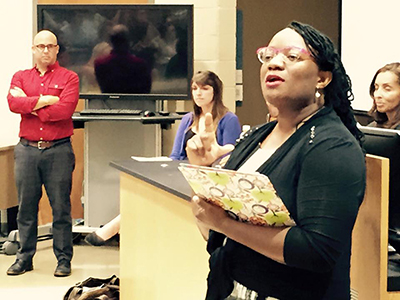Global and intercultural perspectives provided at Miami's "Black Lives Matter" Roundtable

Written by Jana Evans Braziel, Western College Endowed Professor and Department Chair of Global & Intercultural Studies

A packed house attends the Black Lives Matter roundtable discussion.
Over 200 students, faculty members, and staff gathered in Hughes Auditorium for the Department of Global and Intercultural Studies' (GIC) inaugural roundtable discussion, "Black Lives Matter: Global and Intercultural Perspectives" on October 6.
Organized by GIC faculty members José Amador, Tammy Brown, and Mark Peterson, the discussion featured 6 faculty panelists from each of the GIC's programs: Juan Carlos Albarrán (Latin-American, Latino/a, and Caribbean Studies); Denise Bazsile (Black World Studies), Madelyn Detloff (Women's, Gender, and Sexuality Studies), Sandra Garner (American Studies), Nicollette Staton (International Studies), and Lisa Weems (Asian/Asian-American Studies).
Amador identified the topic as "one of the most pressing issues of our time": police brutality and violence against black individuals and the contemporary Black Lives Matter (BLM) movement that challenges the "precarity of black lives" and evokes a profound "sense of moral outrage." Amador asked the audience, "Is moral outrage enough?"
"Black lives matter in the United States and around the world," said Brown, evoking the words of Martin Luther King, Jr., "Injustice anywhere is a threat to justice everywhere."
Peterson argued that racial injustice, institutionalized racism, and racist violence are pervasive phenomenon even beyond the United States. "Anti-immigration prejudice in Europe purports to be about culture and economics, but it is always inflected by race," he said. "Even second, third, and fourth generation Danes of Turkish or Somali descent face anti-immigrant, racist sentiments; [and] they are aware of the BLM movement in the US."
Bazsile delivered an impassioned and personal narrative, informed by her childhood in Detroit shortly after the 1967 race riots that rocked the city. For Bazsile, the legacy of racial violence remains as "ghosts haunting the present moment…remnants of ideas…no longer resid(ing) in the palpable present"; and the murder victims persist, for her, as "traumas of racialized past" in our country. These "unhealed wounds," Bazsile insists, "call on us to do something."

Tammy Brown (foreground) makes a point at the Black Lives Matter roundtable discussion. Jose Amador, Nicollette Staton, and Denise Bazsile (left to right) look on.
For his part, Albarrán talked about his experiences as a Cuban immigrant and now naturalized U.S. citizen and as the father of two mixed race children growing up in the United States. He also pointed to salient examples of anti-black racism in other parts of the Americas, both in Cuba, where the "myth of racial democracy" is belied by continued racism against Afro-Cubanos, and in Hispaniola where Dominicans of Haitian descent have suffered racism, racial violence, discrimination, and disenfranchisement, ultimately rendering them apatrid or stateless.
During the roundtable, Garner brought up the #NativeLivesMatter (NLM) movement to underscore ways in which indigenous citizens have also been negatively impacted by racism, violence, and "structural inequalities." Like African Americans, she explained, Native Americans have been disproportionately victims of police violence, institutionalized racism, and mass incarceration. NLM and BLM activists have issued coalitional "calls for solidarity" and an "ending [of] police atrocities."
Staton shifted the focus beyond the borders of the United States and, arguing that "anti-black racism cannot be separated from anti immigration sentiment," demonstrated how racism, violence, and anti-racist activism has been a notable phenomenon across the world. Revealing the catalytic impact of the BLM movement on global struggles for social justice in major cities across Europe and the Middle East, she discussed solidarity activist movements in London, Paris, Berlin, Amsterdam, Jerusalem, and elsewhere.
Next, Weems explored Asian-American solidarity with the BLM movement and unpacked the "cultural logic of racism" that too often positions Asian-Americans as the "model minority" in tandem with and yet structurally opposed to the falsely perceived "problem minority" of black Americans. She defined this as the "asymmetrical destructive effects" of white supremacy and its racializing logic, adding that the capitalist "production of disposable bodies" treats minorities "not as citizens, but as criminals."
At the end of the roundtable, Detloff offered an intersectional feminist, queer, critical race analysis of the BLM movement, focusing on the national movement and the local grassroots organization in Cincinnati. She highlighted the #SayHerName movement and the Trans People of Color movement, both of which have drawn attention to black women and black trans individuals who are victims of "high rates of police violence." In conclusion, Detloff asked the audience to "Say Her Name. Say Their Names. Their lives matter."
The event ended with a Q&A session with audience members, in which Miami students pointed to the forms of everyday racism that black students and other students of colors confront on campus. In response, Provost Phyllis Callahan told them, "I would like to hear from you about how we might be a more caring environment," about "how we might institute changes" in their lives. "We are listening," she added.
The Department of Global and Intercultural Studies plans to host a student-led forum "Confronting Racism on Campus: Students Talk Back" in November 2015.

